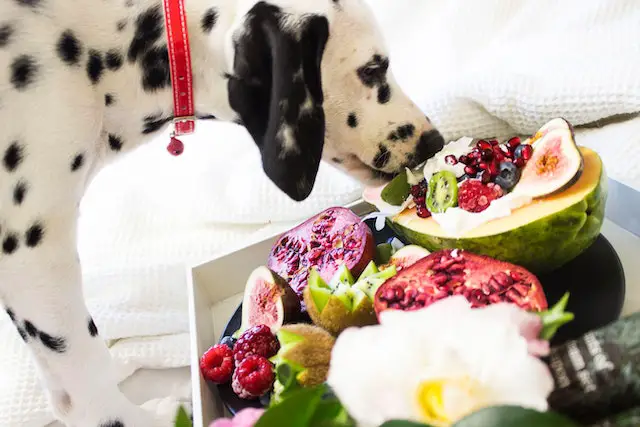Let’s discuss some safe human foods dogs can eat…
We all know how irresistible those puppy dog eyes can be, especially when our furry friends beg for a taste of whatever we’re munching on. But before you give in to those pleading looks, it’s important to ensure that the food you’re sharing is safe for your four-legged companion.
In this blog post, we’ll delve into the world of safe human foods that dogs can eat, so you can treat your pup without any worries or guilt.
Find out more about human foods dogs can not eat.
Safe Human Foods Dogs Can Eat
The following are some common and safe human foods dogs can eat in moderation:
1. Chicken
Chicken can be a safe part of human foods that dogs can eat. It is a lean source of protein that helps to support muscle growth and repair.
When feeding chicken to dogs, it is important to remove the skin and bones as they can be harmful.
Cooked chicken should be plain, without any seasoning or spices, and can be served in small, bite-sized pieces as treats or mixed with their regular dog food.
2. Turkey
Turkey is considered a safe and healthy addition to a dog’s diet. It is a lean source of protein, which helps promote muscle development and repair.
Additionally, turkey provides essential nutrients such as iron, zinc, and B vitamins. When feeding turkey to dogs, it is important to remove the skin and bones, as they can be harmful.
Cooked, plain turkey without any seasonings or additives can be given in small, bite-sized portions as a treat or mixed with their regular food.
3. Beef
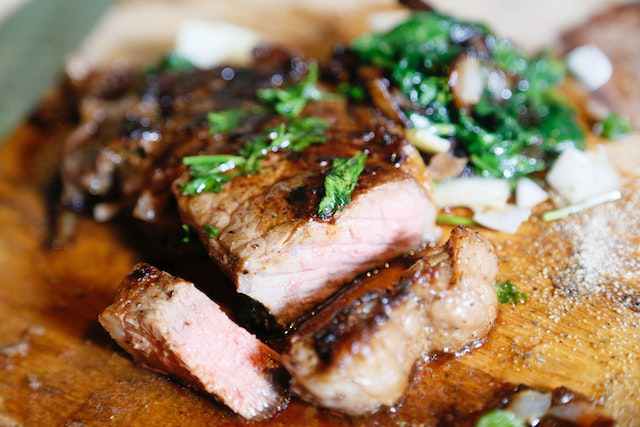
Beef can be a safe part of a dog’s diet when prepared and fed appropriately. It is a good source of protein, essential amino acids, vitamins, and minerals, which contribute to a dog’s overall health.
When feeding beef to dogs, it is important to cook it thoroughly to eliminate any potential bacteria or parasites.
It is recommended to serve lean cuts of beef, remove excess fat and bones, and avoid seasoning or adding any harmful ingredients that can be toxic to dogs.
4. Salmon
Salmon is a safe and nutritious food for dogs to consume. It is an excellent source of omega-3 fatty acids, protein, and essential vitamins and minerals.
These nutrients promote healthy skin and coat, support cognitive function, and boost the immune system. To feed salmon to dogs, it is important to cook it thoroughly, remove any bones, and avoid seasoning or adding any harmful ingredients.
Moderation is key, and it is advisable to consult with a veterinarian for portion control and to ensure that it is suitable for your dog’s specific dietary needs.
5. Sweet Potatoes
Sweet potatoes are a safe and nutritious addition to a dog’s diet. They are a great source of vitamins, minerals, and fiber, promoting healthy digestion and immune function in dogs.
To feed sweet potatoes to dogs, they should be cooked thoroughly to ensure easy digestion.
It’s best to serve them plain, without any added seasonings or toppings, and in moderation as part of a balanced diet for dogs.
6. Carrots
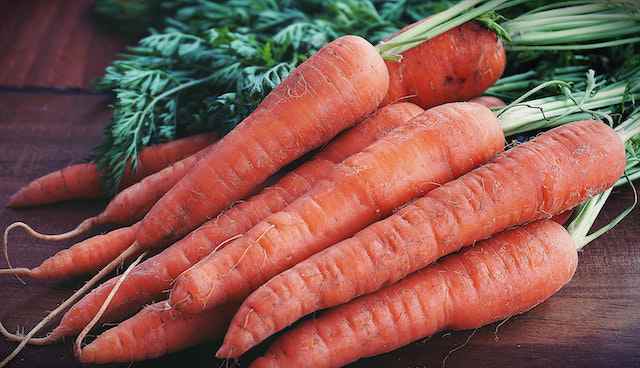
Carrots are a safe and nutritious addition to a dog’s diet. They are low in calories and high in fiber, making them beneficial for digestion and weight management.
Additionally, carrots are packed with vitamins and minerals, including beta-carotene, which promotes healthy eyes and a strong immune system.
To feed carrots to dogs, it is best to cut them into small, bite-sized pieces to prevent choking and facilitate digestion. They can be served raw as a crunchy snack or cooked for a softer texture.
7. Apples
Apples are generally considered safe for dogs to eat and can provide several benefits. They are a good source of vitamins A and C, fiber, and antioxidants, which can support a dog’s immune system and overall health.
However, it’s important to remove the seeds and core before feeding apples to dogs, as these parts can be a choking hazard and contain small amounts of cyanide.
It’s best to feed apples to dogs in small, bite-sized pieces and monitor their digestion to ensure they tolerate the fruit well.
8. Pumpkin
Pumpkin is a safe and nutritious addition to a dog’s diet. It is low in calories and high in fiber, which can help regulate digestion and promote healthy bowel movements in dogs.
Additionally, pumpkin is a good source of vitamins A, C, and E, as well as potassium. To feed pumpkin to dogs, it is recommended to offer it in small amounts as a treat or mix it with their regular food.
It is important to use plain, cooked, and mashed pumpkin without any added sugars or spices.
9. Blueberries
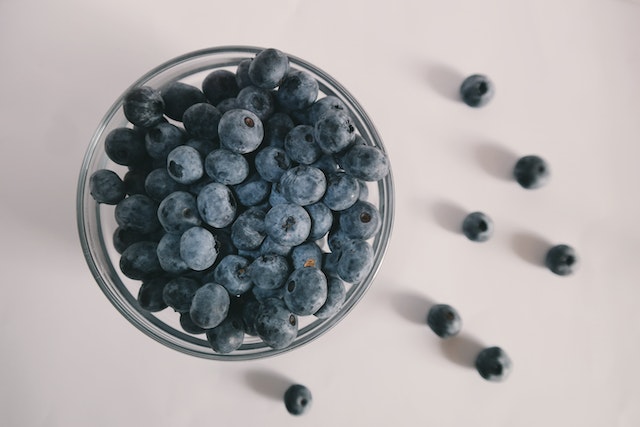
Blueberries are a safe and healthy treat for dogs to enjoy. They offer numerous benefits, including being a great source of antioxidants, vitamins, and fiber.
To feed blueberries to dogs, it’s important to wash them thoroughly and remove any stems or leaves. You can serve them as a whole snack or even mix them into your dog’s regular food for an added nutritional boost.
Remember to introduce new foods gradually and in moderation to avoid any potential digestive issues.
10. Cucumbers
Cucumbers can be a safe addition to a dog’s diet as they are low in calories and fat. They are also a good source of hydration due to their high water content.
To feed cucumbers to dogs, it is important to remove the skin and seeds, as they can be difficult for dogs to digest.
Sliced or diced cucumbers can be given as a healthy and refreshing treat or added to a dog’s regular meals in moderation.
11. Bananas
Bananas can be a safe and healthy addition to a dog’s diet. They are a good source of vitamins such as potassium, vitamin C, and vitamin B6. Feeding bananas in moderation can provide dogs with natural energy and promote digestion due to their fiber content.
To feed bananas to dogs, it is important to remove the peel and cut them into small, bite-sized pieces to prevent choking hazards.
It is always recommended to consult with a veterinarian before introducing any new food into a dog’s diet.
12. Green Beans
Green beans are a safe and healthy addition to a dog’s diet. They are low in calories and high in fiber, which can help with weight management and digestive health.
Green beans also provide vitamins A, C, and K, as well as minerals like iron and potassium. To feed green beans to dogs, they should be cooked or steamed and then cooled before serving.
It is important to avoid seasoning the beans with salt, spices, or oils, as these can be harmful to dogs.
13. Spinach
Spinach is a safe and nutritious addition to a dog’s diet. It is rich in vitamins A, C, and K, as well as iron and fiber. These nutrients can support a dog’s immune system, promote healthy digestion, and contribute to overall well-being.
To feed spinach to dogs, it should be thoroughly washed to remove any dirt or pesticides, then steamed or boiled to make it easier to digest.
It is important to offer spinach in moderation, as excessive consumption can lead to calcium binding and interfere with nutrient absorption.
14. Oatmeal
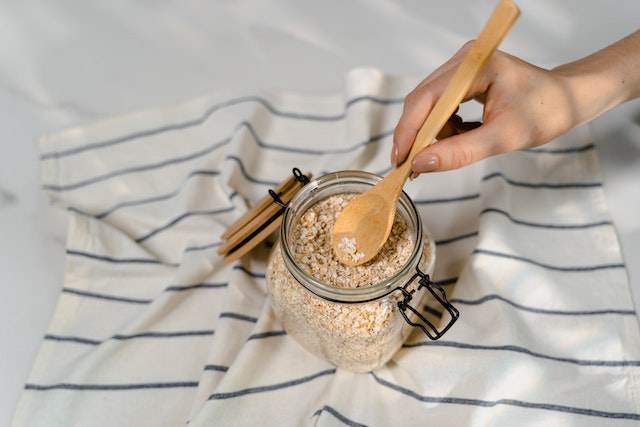
Oatmeal is a safe and nutritious part of a dog’s diet. It offers several benefits, including being a good source of fiber, promoting digestive health, and providing energy.
To feed oatmeal to dogs, it is important to cook it plain and avoid adding any sweeteners or flavorings.
Serve it in small portions and monitor your dog’s response to ensure it is well-tolerated.
15. Rice
Rice is generally considered a safe part of human foods that dogs can eat. It is a good source of carbohydrates and provides energy for dogs.
Additionally, rice is easy to digest and can help soothe digestive issues in dogs. To feed rice to dogs, it should be cooked thoroughly and served plain, without any seasonings or additives.
It is important to remember that rice should only be a part of a balanced diet for dogs and should not replace their regular dog food.
16. Quinoa
Quinoa is considered safe for dogs to eat and can provide several benefits. It is a good source of protein, fiber, and essential nutrients such as iron and magnesium.
To feed quinoa to dogs, it should be cooked thoroughly and served in small portions as a part of their regular diet. It is important to avoid seasoning the quinoa with any harmful ingredients such as salt, garlic, or onions, as these can be toxic to dogs.
Overall, quinoa can be a healthy addition to a dog’s diet when prepared and served appropriately.
17. Eggs
Eggs can be a safe and nutritious addition to a dog’s diet. They are an excellent source of protein, vitamins, and minerals, such as vitamin A, vitamin D, and selenium.
Feeding eggs to dogs can help support their muscle development, promote a healthy coat, and boost their immune system.
To feed eggs to dogs, they should be cooked thoroughly to eliminate the risk of salmonella, and it is recommended to serve them in moderation as part of a balanced diet.
18. Peanut Butter
Peanut butter can be a safe and enjoyable treat for dogs when fed in moderation. It is an excellent source of protein and healthy fats, which can contribute to a shiny coat and promote overall canine health.
When feeding peanut butter to dogs, it is crucial to choose a brand that does not contain xylitol, as this sweetener is toxic to dogs.
Additionally, it is important to serve peanut butter in small amounts and monitor your dog for any signs of allergies or digestive issues.
19. Watermelon
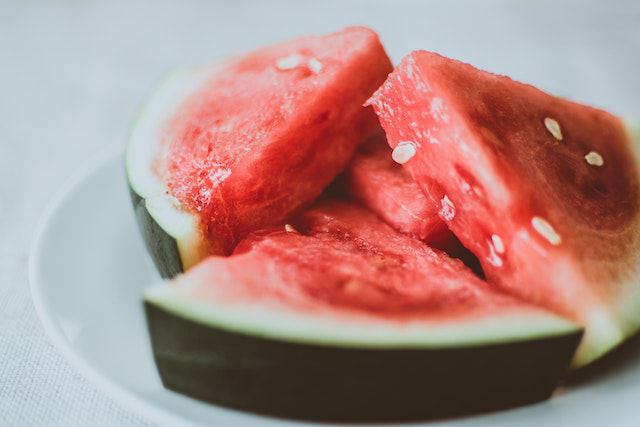
Watermelon can be a safe and healthy treat for dogs when given in moderation. It is a great source of hydration due to its high water content, which can be beneficial during hot weather or after vigorous exercise.
Additionally, watermelon contains essential vitamins such as vitamin A and vitamin C, which support the immune system. To feed watermelon to dogs, it is important to remove the seeds and rind, as they can pose a choking hazard or cause digestive issues.
It is recommended to offer small, bite-sized pieces of fresh watermelon as an occasional treat for dogs.
20. Coconut
Coconut is generally considered safe for dogs to eat in moderation. It can provide several health benefits, such as improved digestion, a boosted immune system, and a healthier coat.
To feed coconut to dogs, it’s important to give them small amounts of unsweetened coconut meat or oil.
However, it’s crucial to introduce coconut gradually and monitor for any adverse reactions, such as stomach upset or allergies.
21. Cantaloupe
Cantaloupe can be a safe and healthy addition to a dog’s diet when given in moderation. It is packed with essential nutrients like vitamins A and C, as well as fiber, which can support a dog’s overall health.
To feed cantaloupe to dogs, it is important to remove the rind and seeds, as they can pose a choking hazard. Cut the cantaloupe into small, bite-sized pieces and offer it as a treat or mix it into their regular food for added variety.
Remember to introduce new foods gradually and monitor your dog for any signs of digestive upset.
22. Celery
Celery is considered a safe and healthy addition to a dog’s diet. It is low in calories and high in fiber, making it a great snack option for dogs looking to shed some pounds.
Celery also contains essential vitamins and minerals, including vitamin K, vitamin C, and potassium, which can contribute to a dog’s overall health and well-being.
When feeding celery to dogs, it is important to cut it into bite-sized pieces to prevent choking and to remove any leaves or tough strings to avoid digestive issues.
23. Pineapple
Pineapple can be a safe and healthy addition to a dog’s diet when fed in moderation. It is rich in essential nutrients like vitamin C, manganese, and fiber, which can support a dog’s overall health.
However, it is important to remove the tough outer skin and hard core before feeding pineapple to dogs, as these parts can be difficult for them to digest.
It is best to offer pineapple as a small treat or mix it with their regular food as an occasional supplement.
24. Mango
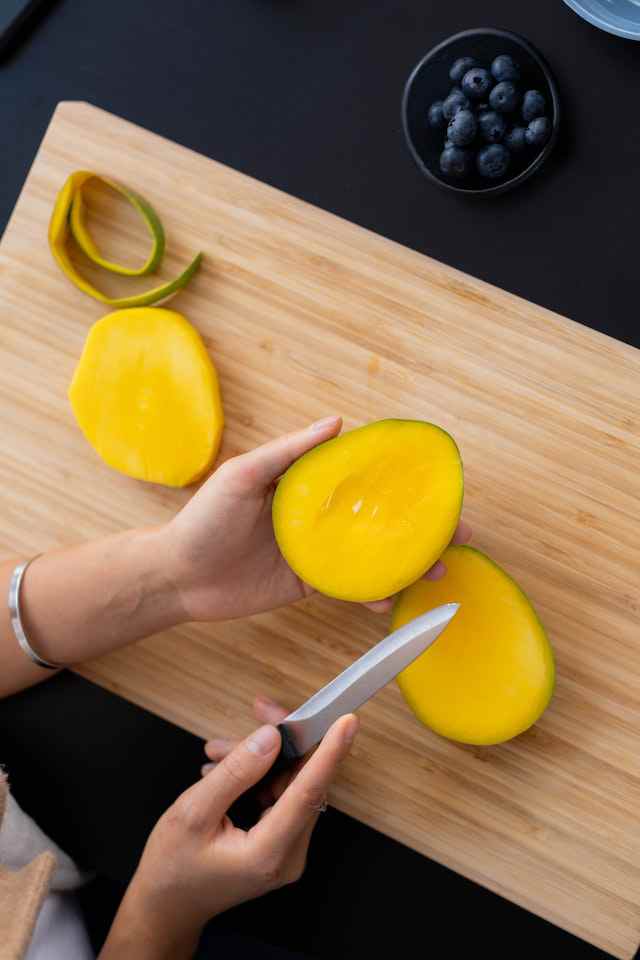
Mango is generally safe for dogs to consume in moderation. It is a nutritious fruit that provides essential vitamins such as vitamins A, C, and E, as well as dietary fiber.
However, it is important to remove the skin and pit before feeding mango to dogs, as these parts can be choking hazards and difficult to digest.
It is recommended to cut the mango into small, bite-sized pieces and feed it as an occasional treat or mix it with their regular dog food to add variety to their diet.
25. Peas
Peas can be a safe and nutritious addition to a dog’s diet. They are rich in vitamins, minerals, and fiber, which can support digestion and overall health.
To feed peas to dogs, it is recommended to cook or steam them to make them easier to digest.
Peas can be added to a dog’s regular meals or served as a healthy treat in moderation, ensuring they are thoroughly cooked and free from any seasonings or additives that may be harmful to dogs.
26. Broccoli
Broccoli is a safe and nutritious addition to a dog’s diet. It is packed with essential vitamins and minerals, such as vitamin C, fiber, and antioxidants.
These nutrients can help support a dog’s immune system, promote healthy digestion, and contribute to overall well-being. To feed broccoli to dogs, it is important to steam or lightly cook it to enhance digestibility.
Serve it in small, bite-sized pieces as a treat or mix it into their regular meals in moderation to avoid digestive upset.
27. Cauliflower
Cauliflower is a safe vegetable for dogs to eat, as long as it is prepared properly. It is low in calories and high in fiber, making it a healthy addition to their diet.
To feed cauliflower to dogs, it should be cooked thoroughly and served in small, bite-sized pieces to prevent choking. It can be given as a treat or mixed into their regular meals for added nutrition.
28. Zucchini
Zucchini is a safe and nutritious addition to a dog’s diet. It is low in calories, high in fiber, and packed with essential vitamins and minerals.
Feeding zucchini to dogs can help with digestion, weight management, and overall health.
To incorporate zucchini into a dog’s diet, it should be cooked, sliced into small, manageable pieces, and served in moderation to avoid any digestive issues.
29. Brussels Sprouts
Brussels sprouts can be a safe addition to a dog’s diet as they are low in calories and high in nutrients. They provide a good source of fiber, vitamins C and K, and antioxidants.
To feed Brussels sprouts to dogs, they should be cooked thoroughly to aid digestion and avoid potential digestive issues.
It is important to introduce them gradually into the dog’s diet and monitor for any adverse reactions.
30. Oranges
Oranges can be a safe part of a dog’s diet when fed in moderation. They are a great source of vitamin C, which can boost the immune system and promote overall health.
However, it’s important to note that oranges should be given to dogs in small amounts due to their high sugar content.
To feed oranges to dogs, remove the peel and seeds, and cut the fruit into small, bite-sized pieces. Introduce oranges gradually to your dog’s diet and monitor for any adverse reactions.
31. Strawberries
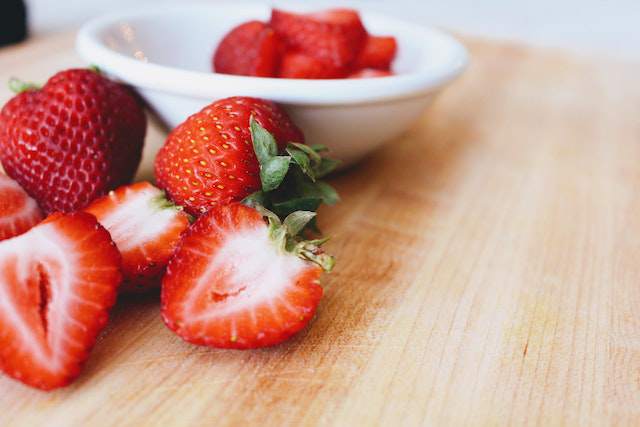
Strawberries are safe for dogs to eat in moderation as they are low in calories and fat. They are a good source of vitamins C and K, fiber, and antioxidants which can support a dog’s immune system and promote overall health.
To feed strawberries to dogs, wash them thoroughly, remove the stems, and cut them into small, bite-sized pieces to prevent choking hazards.
It’s important to introduce strawberries gradually into a dog’s diet and monitor for any adverse reactions such as digestive upset.
32. Shrimp
Shrimp can be a safe and healthy addition to a dog’s diet when fed in moderation. It provides essential nutrients such as protein, omega-3 fatty acids, and vitamins.
To feed shrimp to dogs, it should be cooked thoroughly to eliminate the risk of bacteria or parasites.
It’s important to remove the shell, and tail, and devein the shrimp before offering it to your furry friend as a treat or as part of their regular meals.
33. Peaches
Peaches can be a safe and nutritious addition to a dog’s diet when given in moderation. They are a good source of vitamins A and C, as well as fiber.
However, it’s important to note that dogs should only eat the flesh of the peach and not the pit or skin, as they can pose a choking hazard or cause digestive issues.
To feed peaches to dogs, remove the pit and skin, and cut the flesh into small, bite-sized pieces. Offer peaches as an occasional treat, and monitor your dog for any adverse reactions.
34. Sardines
Sardines can be a safe and healthy addition to a dog’s diet. They are high in omega-3 fatty acids, which have numerous benefits for dogs, including promoting a healthy coat and skin, supporting joint health, and boosting immune function.
To feed sardines to dogs, it is best to offer them in moderation and as a treat or supplement to their regular diet.
It is important to choose sardines packed in water or in their own natural oils, avoiding those packed in salt or artificial additives.
35. Tuna
Tuna can be a safe part of human foods that dogs can eat, but it should be given in moderation. It is a good source of lean protein, omega-3 fatty acids, and essential nutrients.
To feed tuna to dogs, it is recommended to use fresh, cooked, and boneless tuna. It should be served plain without any added seasonings or oils.
It is important to note that tuna should not be a regular part of a dog’s diet and should be given as an occasional treat.
36. Bread
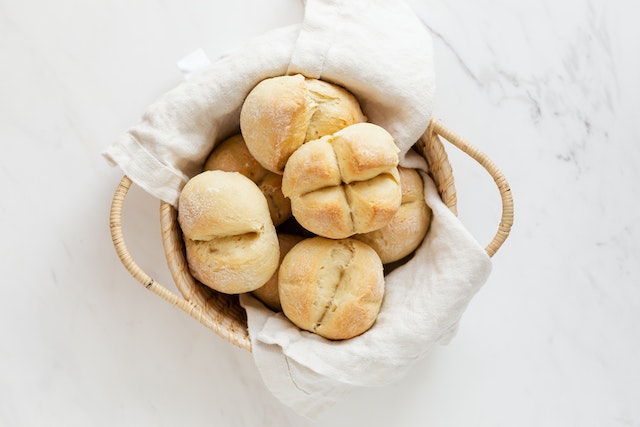
Bread can be a safe and occasional treat for dogs when fed in moderation. It provides energy and can be a source of fiber.
However, it is important to note that not all types of bread are safe for dogs, as some may contain ingredients that can be harmful, such as raisins, onions, or garlic.
When feeding bread to dogs, it should be plain, without any added sugars, salt, or seasonings, and should be given in small pieces to avoid digestive issues.
37. Popcorn
Popcorn can be a safe and enjoyable treat for dogs when prepared and served properly.
It is low in calories and fat, making it a healthier option compared to other snacks. It also contains fiber, which can aid in digestion.
To feed popcorn to dogs, it is important to avoid any added seasonings, butter, or salt, as these can be harmful to them. Plain, air-popped popcorn in moderation can be given as a treat or training reward for dogs.
38. Yogurt
Yogurt can be a safe addition to a dog’s diet, but certain precautions should be taken.
It is important to choose plain, unsweetened yogurt without any additives or artificial sweeteners, as these can be harmful to dogs.
Yogurt can provide dogs with probiotics, which can aid in digestion and promote a healthy gut.
To feed yogurt to dogs, start with small amounts and gradually increase the serving size.
39. Kale
Kale can be a safe addition to a dog’s diet when fed in moderation. It is packed with essential nutrients such as vitamins A, C, and K, as well as calcium and fiber.
These nutrients contribute to a healthy immune system, bone strength, and digestion in dogs. To feed kale to dogs, it is important to remove the tough stems and chop the leaves into small, bite-sized pieces.
It is recommended to steam or lightly cook kale before serving it to dogs to enhance its digestibility.
40. Parsley
Parsley is a safe herb that dogs can consume in moderation as part of their diet. It offers several benefits, including freshening their breath, providing antioxidants, and supporting urinary health.
To feed parsley to dogs, it is recommended to chop it finely and mix it with their regular food or offer it as a treat.
However, it’s important to note that while parsley is generally safe, excessive consumption may lead to digestive issues, so it should be given in small amounts.
41. Raspberries
Raspberries can be a safe and healthy addition to a dog’s diet. They are rich in antioxidants, vitamins, and fiber, which can support a dog’s overall health.
To feed raspberries to dogs, it’s important to wash them thoroughly and remove any leaves or stems.
It’s best to offer raspberries in moderation as a treat or mixed with their regular dog food to avoid digestive issues.
42. Kiwis
Kiwis can be a safe and nutritious addition to a dog’s diet. They are rich in vitamins C and E, as well as fiber, which can support the immune system and promote healthy digestion.
To feed kiwis to dogs, it is important to remove the skin and seeds, as they can pose a choking hazard.
It is recommended to offer kiwis in small, bite-sized pieces as an occasional treat, taking into consideration any dietary restrictions or allergies that your dog may have.
43. Tomatoes
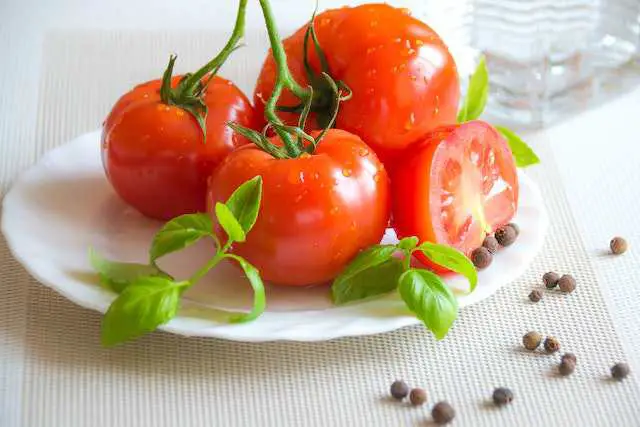
Tomatoes can be a safe part of a dog’s diet when fed in moderation. They contain vitamins A, C, and K, as well as potassium and fiber, which can support a dog’s overall health.
However, it’s important to note that the green parts of the tomato, including the leaves and stems, can be toxic to dogs.
When feeding tomatoes to dogs, it’s best to remove the green parts, chop the tomato into small, bite-sized pieces, and serve it as an occasional treat or mixed with their regular food.
44. Corn
Corn can be a safe part of a dog’s diet when fed in moderation. It is a good source of carbohydrates, fiber, and essential nutrients such as vitamins and minerals.
However, it should be served in cooked form and without any seasoning or additives.
It is important to note that while corn can be included in a dog’s diet, it should not be the primary source of nutrition and should be balanced with other healthy foods.
45. Cashews
Cashews can be a safe part of human foods that dogs can eat in moderation. They are a good source of healthy fats, protein, and essential minerals like magnesium and zinc.
However, it’s important to remember that dogs should only eat plain, unsalted cashews as excessive salt can be harmful to them.
To feed cashews to dogs, it’s best to chop them into small, bite-sized pieces to prevent choking hazards and give them as occasional treats, considering their high-fat content.
46. Lamb
Lamb can be a safe part of human foods that dogs can eat. It is a great source of protein, vitamins, and minerals.
However, it is important to feed dogs lean cuts of lamb and avoid fatty or seasoned preparations. It is recommended to cook lamb thoroughly and remove any bones before feeding it to dogs.
Serve it in small, controlled portions as a treat or mix it with their regular dog food for added nutrition.
47. Duck
Duck can be a safe and nutritious addition to a dog’s diet. It is a good source of protein, vitamins, and minerals.
The lean meat can contribute to muscle development and maintenance, while the fatty acids in duck can support healthy skin and coat.
To feed duck to dogs, it is best to cook it thoroughly, remove any bones, and serve it in small, appropriate portions as part of a balanced diet.
48. Cashews
Cashews can be a safe part of human foods that dogs can eat. They are a good source of protein and healthy fats for dogs.
However, it is important to feed cashews to dogs in moderation due to their high-fat content, as excessive consumption can lead to weight gain and digestive issues.
To feed cashews to dogs, it is advisable to first consult with a veterinarian to ensure that it is suitable for their specific dietary needs and to determine the appropriate serving size.
49. Rabbit
Rabbits can be a safe and nutritious addition to a dog’s diet. They are a good source of lean protein, vitamins, and minerals.
Feeding rabbits to dogs can help support their muscle development and provide essential nutrients. It is important to cook the rabbit thoroughly and remove any bones before serving it to dogs.
Moderation is key, and it’s always recommended to consult with a veterinarian before introducing any new food into a dog’s diet.
50. Pork
Pork can be a safe part of human foods that dogs can eat, but it should be given in moderation. It is a good source of protein, vitamins, and minerals for dogs.
When feeding pork to dogs, it is important to ensure that it is cooked thoroughly to eliminate any harmful bacteria. Additionally, fatty cuts should be avoided as they can cause digestive issues.
Conclusion
So there you have it, dear dog lovers! You now have a handy list of safe and delicious human foods that you can share with your canine companion.
Remember, moderation is key and it’s always a good idea to consult with your veterinarian before making any significant changes to your pup’s diet.
With the right knowledge and a little bit of caution, you can enjoy some delightful food moments together, wagging tails included!

